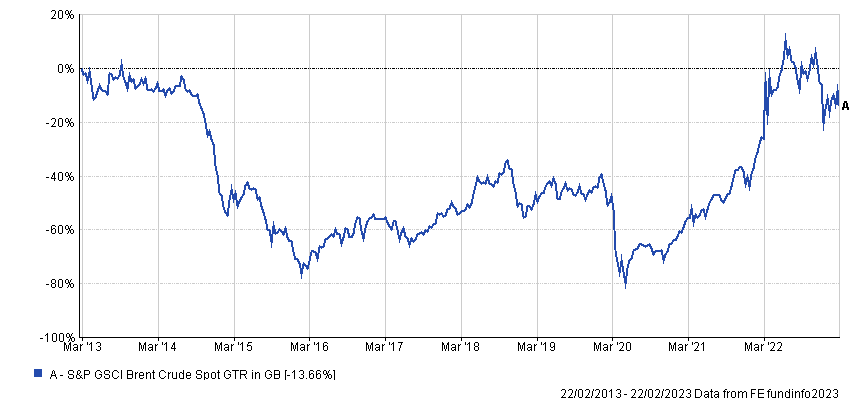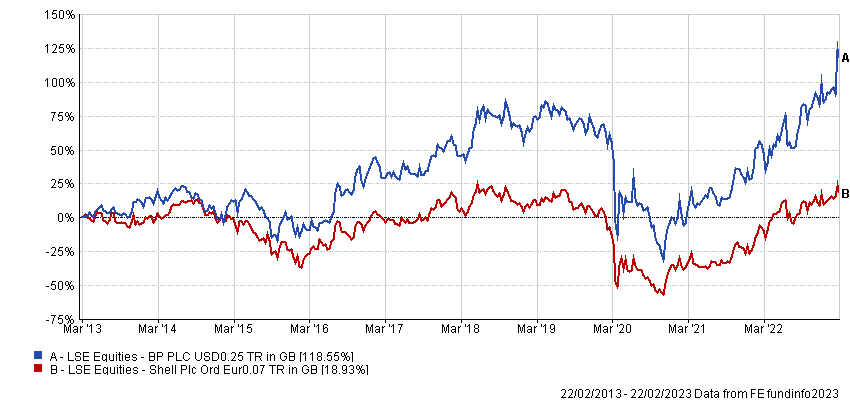Fidelity’s Alex Wright has already sold out of most of his position in Shell, citing its failure to cut costs and its expansion into less profitable areas as reasons for concern.
The manager of the Fidelity Special Values trust and Fidelity Special Situations fund bought into oil & gas stocks on valuation grounds following the collapse of the oil price in 2020, just as he did when it fell in 2015.
Performance of index over 10yrs

Source: FE Analytics
However, he said what disappointed him about the reaction of the oil majors to the more recent slide was the decision to cut dividends – and not from an income point of view.
“The majors held their dividends in 2015, and to do that they really had to cut back on capex [capital expenditure] and opex [operating expenditure], really slim the businesses down to improve returns,” he explained.
“In a sector like oil where you see very cyclical and generally quite low returns on capital, that's exactly where you want to be investing: where companies are cutting costs and giving you back that cash, because average returns when they invest it are generally below the cost of capital.
He added: “This is not a great industry. It's not a high-return business, it's volatile, and return on capex is low. This time both BP and Shell cut their dividends quite substantially and committed to continuing to spend on capex where their track record is poor.”
Performance of equities over 10yrs

Source: FE Analytics
This is at odds with the reason given by many fund managers for buying into the sector since the Covid crash. They claim that environmental issues and better capital discipline have prevented oil & gas companies from investing in new capacity, which is what usually brings down the price of these commodities. Therefore, returns should stay high.
However, Wright said that what is even worse than investing in new oil & gas capacity is that these companies are ploughing money into an area where they have no expertise or competitive advantages – renewables.
“There's a lot of competition, a lot of capital investment, and because of the zero cost of capital, really, really low returns,” he continued.
“They make maybe 10% in their core business, and if they do a really great job in renewables, they maybe make 5%. For me, that's a really unattractive return profile in terms of reinvestment, and even worse, BP started selling some of its core business at very low multiples.
“I do think the lack of investment in oil & gas means returns can be higher. But if you're then looking to invest in something else completely, you're not actually a play on that.”
Wright still has about 10% of Fidelity Special Values’ portfolio in oil & gas, but this is mainly in companies further down the market cap spectrum that “stick to their knitting”.
For example, he bought into Austrian company OMV after Russia invaded Ukraine on the basis that it will continue to invest in its core businesses of oil, gas and petrochemicals. He is particularly excited about its gas business, saying the price of this commodity is likely to remain structurally higher following the Ukraine war, and noted the company owns plenty of undeveloped gas fields, particularly in Europe.
He also bought Ithaca Energy at IPO in November, but this has done poorly since then as the North Sea windfall tax increased more than expected. However, Wright said the difference between the perceived risk and the actual risk of further taxes meant this presented an opportunity to add to his holding.
“Once there's been a negative event that's worse than you expect, people always then say there are going to be further negative events,” he continued.
“Obviously, windfall taxes are an issue globally for commodity producers because prices are so high and governments have big deficits. But the UK has one of the highest tax rates globally, especially if you look at the limited investment allowance, so I think it's unlikely to rise from here.”
Wright is not against renewable energy and is aware of the need to expand this area. He also said it is a growth market, and the government is right to incentivise it. But this doesn’t make it an attractive investment.
“There's a huge amount of competition and pretty much anybody can install a solar farm or an onshore windfarm,” he added. “Therefore, returns from this area are really low.”




